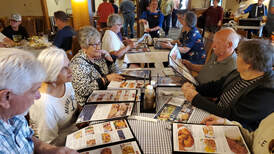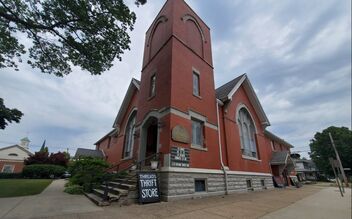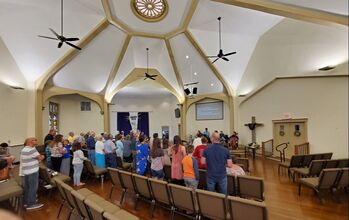|
6/11/2023 0 Comments June 12, 2023Teaching | Mission Update | Prayers
Video above/Transcript below
This Week's Teaching: "How Much Theological Disparity Should Our Microchurches Tolerate?"
Here's the question. Do our small gatherings need to be theologically homogenous? Do we need to all believe the same things, have the same orientation doctrinally in order to be a group together? And how much theological disparity can we tolerate or celebrate in our groups before it's just a nuisance, before it's unhelpful to the conversation.
I think it's a serious, genuine question. In the Christian Church, in the Christian faith these days, there is a breadth of theological difference. A doctrinal difference. And some of it you could describe as doctrinal disparity, and some of it could just be like bumping out at the edges and having conversations. If we could talk about it as one side being Catholic and the other side being Protestant, that's kind of obvious. That's a 500 year old thing. But within the Protestant side, then you have this other continuum that could be from Presbyterian to Pentecostal. And somewhere in there you would have all these different thoughts about how to live out our faith, and what is true, and how do we follow Jesus, and all that. And so within that you would have everything from just fundamentalists to word of faith or prosperity doctrine. You would have those two things. And if you put people with those two opinions in the same group and start studying the scriptures, you're gonna have some sparks fly. Is it disruptive to have people with different doctrinal positions in the same group? Or is it helpful to have all those views represented in the same conversation? I believe the church these days has fallen in love with certitude and, as I've taught before, has conflated certitude with faith. And so we don't really have faith unless we believe it, like to our dying breath, and I'm talking about even just doctrinal sorts of things. It's like "it happened this way, this is the correct way to talk about it." But when you get into things like atonement theory and end times and what the church should look like and all those things, you have differences of opinion that are not heretical. And once you call it heretical, you, I believe, have engaged in heresy because you're declaring with certitude something that the scriptures don't declare with certitude. When we talk about theological unity and disparity, it's helpful to think of a triangle and divide that triangle with two lines so that there's three parts, and at the top we have what we would call consensus. These are the things that all Christians believe. Consensus. We're not still trying to figure out these things. Consensus. The next one down, which gets a little bigger, we can call convictions. These would be like the personal convictions. These are the things that as I study it, I go, "Ah, this is what I believe." And groups of people get together and they say, "As we study it, this is what we believe; these are our convictions on the matter." But there's not consensus about it. There's plenty of Christians -- people who study the Bible from a sincere heart -- there are plenty of people who arrive at different conclusions about those convictions. And so we can't call it consensus. We can call it convictions. Then the lowest one, the widest, the biggest one is what I would call conjecture. And this is when we read something in scripture and it says this, and it says this and maybe those two things are up in the convictions category or maybe even up in the consensus, but there's something in between the two that scripture doesn't talk about with clarity, we feel the need to bridge the gap between these two truths. And we do that with a bridge that we can call conjecture or speculation. In the groups that I lead, frequently, when we have these discussions and we get into the scriptures, someone inevitably will say, "Well, I've always thought that it means this," or "I heard that it means this," or, "Hmm, what if it means this?" And what I ask when I'm leading those groups, I say, "What's the word that we call that?" And if they've been in my group long enough, they'll say, "Speculation." Conjecture. We are speculating how to bridge the gap between this and this. These two things that we hold to be true -- and that scripture says overtly, explicitly these two things -- we bridge the gap with something that is... we speculate. What if it's this? And what I'll always say is that the speculation might be spot on. It might be right, you might have just solved the whole thing, like you're the first one. You might have solved it. Your speculation might be spot on, but it's still speculation, because scripture doesn't speak to it. And so hold it loosely. Hold it in open hands. That's what I would call conjecture. Now, if you look at the Christian faith, those who follow Christ, and the different systems and the different doctrinal unions that we've established around our faith in Christ, you'll see that most of the doctrinal positions live in the area of conjecture. Now I'm talking quantitatively, like there are so many different beliefs about the different things -- and I'll say in a little bit why I think God has let it be this way -- but so many different beliefs, about so many different things live in this lower, broader, wider, deeper, vast thing we call conjecture. We don't agree [about] these things. We haven't found consensus. And oftentimes we haven't even found personal conviction. We're still just exploring. But even when you bump up a little bit and you get into the area of personal conviction and you have doctrinal positions, that whole groups of Christians will hang their hat on , even there, you just don't have consensus. You don't have consensus. Only when you get up into the smaller top of that triangle, do you have consensus. And those things are the important things. So the question I asked my pastor way back when. When I was young, I asked him, why didn't God just tell us everything that we're supposed to believe about everything? Just write all the doctrines down in the book. Why does it have to be, you know, so thick? Why does it have to be so long? And why does it have to be stories? And, why do we have to study it and search it? And he said, "I think God left it all open so that the only thing we can unite around is the belief that Jesus is Lord." Otherwise we will unite around our belief about all these little intricate things and then we fight and argue about it. And really that is what we try to do. We try to find people who agree with us about the details of things, and we forget that God's primary call is that we would know him. And that we would believe that Jesus is Lord. The lordship of Jesus. Now one tricky thing that we do in Christian circles which eliminates all the tension is we treat our own convictions as consensus. And if we do that, so if I gather you around me and like we all believe this one thing about -- pick a topic: hell or, or how to be saved, can you lose your salvation, what about faith and what about proclamations, whatever that topic is -- and we say, those who are of like conviction about this, we are truly in the faith and everyone else is outside the faith. You've taken those personal convictions and you've said, That is the consensus. If you don't have consensus about these details, you are outside the faith. And with that, we've alleviated that tension of having people push back at our beliefs, at our convictions. But we've also played the part of God. Now, Jesus said that in the end times the angels would come and they would separate the righteous from the unrighteous, those who are in, from those who are out. And he said that our temptation would be for us to do it, to decide who's in and who's out. And his message was clear: "You don't do that. I do that. I do that." And so we have to decide at what point do we say you have to believe the same things in order to be in. And I would even say, at what point do we even have to answer the question, are you in or are you out? And I believe there is a point where we say we are gathered around one thing that we all hold in common, and, as my pastor said years ago, that one thing is: Jesus is Lord. Jesus is Lord. This is our theology. This is our spirituality. This is our mission. Jesus is Lord. Now I'm gonna put a link below to a book that I wrote. This isn't a sales pitch, this is just, if it's helpful to continue the conversation. I put so much thought into this book: One Together -- a Vision for Ending Division. And it develops this whole thought that our unity would be around the theology that Jesus is Lord, a common spirituality where Jesus is Lord and a common mission where Jesus is Lord. And so I'll put that in the link below. You can go get it if that's helpful to you. As it relates to when we get together, and the question, how much doctrinal disparity, how much theological disparity can we handle in a group before it just becomes a distraction? I personally believe that if we have the conviction that God has revealed himself to us in scripture, I think it's good to gather around that. And if someone has, like, grossly different interpretations about scripture, I still think it can be helpful to get together and read those scriptures out loud. And discuss them. Now, if someone comes in with an argumentative bent, trying to just advance their agenda, whatever that agenda is, whether it's very liberal, progressive, or whether it's very conservative or fundamentalist, if they come in with this, "you've gotta believe what I believe," and it's just pushing, I think that's the thing that causes destruction. That's the disparity that no group can handle. That's the thing that says you have to believe my convictions in order to really be in the faith. But if we can bring people together around scriptures... I'll say it this way: If I'm in a group of people who are decidedly reading the scriptures to learn from them and to adjust their life to the truth held out in and revealed through those scriptures -- if I'm reading those scriptures and discussing them with people who have the same conviction, then I believe it's good for me to be in that conversation, even if they have arrived at different convictions about the details of things. And at the core of that, there needs to be a common devotion to Jesus as Lord. If that's not there, then what are we doing? And so, like I said last week in my teaching, someone said that they're not convinced that Jesus is the only way for everyone. "He is for me, but he is not for everyone." And I would say even if they're not convinced about Jesus, they can come in and they can inquire. As Paul talked about in first Corinthians 14, they can come in as inquirers. Absolutely. But they don't lead the discussion. They can voice their doubts, of course. But we are gathered not trying to decide whether Jesus is the way, truth, and life. We are gathered to decide how we can best live out that truth, that consensus as followers of Jesus believing he is Lord. And we are gathered looking into the scriptures to see how we can best understand him. Paul wrote about it in Philippians two. He says, " Therefore, if you have any encouragement from being united with Christ, if any comfort from his love, if any common sharing in the Spirit, if any tenderness and compassion, then make my joy complete by being like-minded, having the same love." Listen, he's not talking about doctrinal specifics. He's talking about the attitude of your mind, of your heart. "Then make my joy complete by being like-minded." If you've come into the faith, if you have been encouraged in your union with Christ, if you've found comfort from his love, if you've been drawn to him in the Spirit, if you have any tenderness and compassion from your faith, then "make my joy complete," he says, "by being, like-minded, having the same love, being one in spirit and of one mind," the attitude, the direction, the quality. "Do nothing out of selfish ambition or vain conceit. Rather, in humility, value others above yourselves, not looking to your own interests, but each of you to the interests of the others." I believe if we were to do this, and if we were to choose a common love, our devotion to Jesus as Lord, and a common love that leans toward each other saying, we are in this together; we want to know Christ together -- I believe this humility that says, " I don't have it all figured out," but I can genuinely and tenderly bring my convictions to the conversation and even my speculations, my conjecture to the conversation and inviting other people to do the same and saying, we have a common love for the Lord, we are practicing a common love for each other, we are choosing to be in union with each other in searching the scriptures, I believe that is the healthy place for a group to be. And I would even go so far as to say that a group that is only theologically homogenous, only has all the same convictions and conjectures, I believe that's a dangerous place to be. I'm not saying it sends you to hell. I'm saying it's a dangerous place to be because you are never pressed. When you have an experience in life that doesn't line up with that theological homogeny. If you have an experience and you bring it into the group and say, "But it doesn't work this way in my life," you will feel cast out. You will not have support there. And you won't be able to grow through that experience as God has designed it for you. I believe it's a dangerous place to be, to say we have to all believe everything alike doctrinally in order to be in fellowship. You just don't find that in scripture. But we do have to believe Jesus is Lord. That is the crux of our faith. We do have to be of like mind and like heart. We do have to love tenderly and with compassion and be humble toward each other, putting others' interests ahead of our own. And so the question, should our groups be theologically homogenous? No. No. Is there room for doctrinal disparity? Yes. What is the thing that we gather around? The conviction, the consensus that Jesus is Lord, and that the scriptures are here for our edification. As Paul wrote to Timothy, "All scripture, is God breathed," or inspired, "and is useful for teaching, rebuking, correcting, and training in righteousness so that the servant of God may be thoroughly equipped for every good work." If we bring that as our consensus, we're good. We're good. So my encouragement to you is if you're getting together with other people in a small group to read the scriptures, to devote yourselves to the apostle's teaching, to prayer, to fellowship, to the breaking of bread. If you're getting together with others to do this, don't despair when people believe differently. Lean in with humility. Go ahead and engage with zeal, but with humility, considering others' interests as more important than your own. Bow before Jesus together. There is something tremendously orienting about that. And so I'll leave you with that. Jesus is Lord. Amen. Mission Update
Prayers
0 Comments
Leave a Reply. |
AuthorRoger Shenk is the pastor of X242, a network of microchurches. Archives
July 2024
Categories |
Search by typing & pressing enter





 RSS Feed
RSS Feed